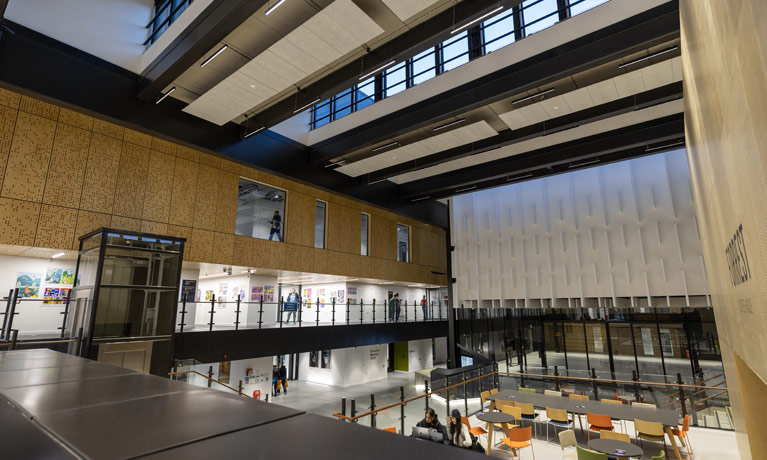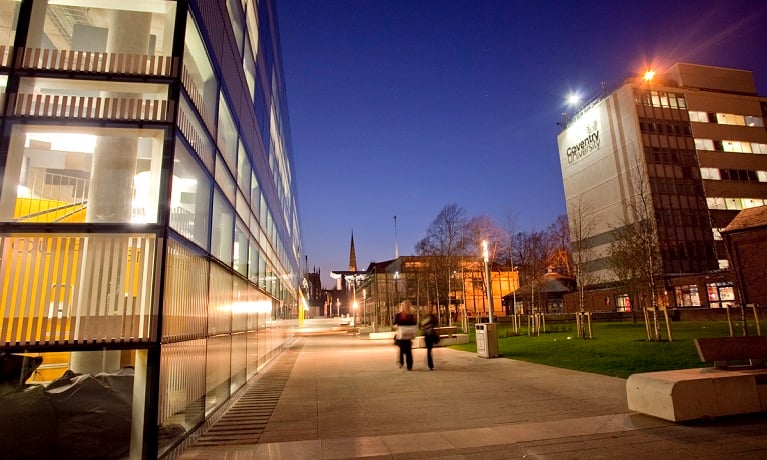Search
English Literature MA
Study level: Postgraduate
The English Literature MA explores the relationship between literature and the environment — an area of both scholarly growth and pressing concern.
Year of entry
2024-25
Location
Coventry University (Coventry)
Study mode
Full-time
Part-time
Duration
1 year full-time
2 years part-time
Course code
AHT060
Start date
September 2024
January 2025
May 2025
Course overview
English Literature MA is an exciting opportunity to study local and global literatures from the Renaissance through to the present day.
The course aims to equip you for further academic study as well as employment in public and private sector research organisations.
It fosters transferable analytical, critical, organisational and research skills that are in demand in a wide variety of workplaces, industries and careers, and should prepare you to be active and engaged citizens in a time of global environmental crisis.
In the decarbonising economies of the coming decades, in Britain and the wider world, our graduates should be ready to participate in the careers and industries that will emerge to tackle the climate crisis.
Rated Gold Overall
Teaching Excellence Framework (TEF) 20235 QS Stars for Teaching and Facilities
QS Stars University RatingsTop 5 Student City in England (Coventry)
QS Best Student Cities Index 2025Why you should study this course
- Engaging with cutting-edge critical theories and through embodied learning, you will consider the importance of literature for the regional and global concerns of the 21st century.
- You can expect to explore a range of topics including regional studies and spatiality (including the literature of the English Midlands), postcolonial literature, Shakespearean Spaces, Romantic literature, literatures of the American West and Gothic literature.
- This course emphasises real-world engagement and experiential learning. There are opportunities for field trips2 that encourage you to reflect on how the environment shapes the work of writers and your own work.
- You could also have the chance to conduct in-depth case studies of how literature has galvanised communities of resistance in response to environmental catastrophes.
- You will have the option to apply for a ‘professional experience’ opportunity2, designed to further develop your skills and knowledge with the aim of maximising your employability prospects. See the 'What you'll study' section for more information.
Collaborations with other organisations
Confucius Institute
The School of Humanities is home to the Confucius Institute. This is a collaboration created with the Jiangxi University of Finance and Economics, which aims to promote an understanding of the Chinese language and culture.
Coventry Degree Show 2023
The Coventry Degree Show is an annual event to celebrate and showcase our graduating students’ work.
Explore the work of our talented students
What you'll study
With professional experience option
The professional experience opportunity2 enables you the opportunity to apply for optional professional experience in semester 1, which, upon successfully securing an opportunity, will extend the duration of your master’s to either 16, 20 or 24 months. The professional experience provides an opportunity for you to develop expertise and experience in your chosen field with the aim of enhancing your employability.
Please note that the optional professional experience modules incur an additional tuition fee, which for one semester of professional experience is £1,333.33, for two semesters of professional experience is £2,666.67, and for three semesters of professional experience is £4,000.
Professional experience may also be subject to additional costs, visa requirements being met, subject to availability and/or competitive application. Professional experience opportunities are not guaranteed but you will benefit from the support of our Talent Team in trying to find and secure an opportunity. Find out more about the professional experience option.
We regularly review our course content, to make it relevant and current for the benefit of our students. For these reasons, course modules may be updated.
How you'll learn
Teaching methods could include:
- Lectures
- Seminars
- Tutorials
- Presentations
- Group projects
- Workshops
This course can be offered on a part-time basis. Whilst we would like to give you all the information about our part-time offering here, it is tailored for each course each year depending on the number of part-time applicants. Therefore, the part-time teaching arrangements vary. Request further information about part-time study.
Teaching contact hours
The number of full-time contact hours may vary from semester to semester, however, on average, it is likely to be around 10 contact hours per week in the first year.
Additionally, you will be expected to undertake significant self-directed study of approximately 35 hours each week, depending on the demands of individual modules.
The contact hours may be made up of a combination of face-to-face teaching, individual and group tutorials, and online classes and tutorials.
As an innovative and enterprising institution, the university may seek to utilise emerging technologies within the student experience. For all courses (whether on-campus, blended, or distance learning), the university may deliver certain contact hours and assessments via online technologies and methods.
Since COVID-19, we have delivered our courses in a variety of forms, in line with public authority guidance, decisions, or orders and we will continue to adapt our delivery as appropriate. Whether on campus or online, our key priority is staff and student safety.
Assessment
This course will be assessed using a variety of methods which will vary depending on the module.
Assessment methods may include:
- Group work
- Presentations
- Projects
- Coursework
- Individual Assignments
The Coventry University Group assessment strategy ensures that our courses are fairly assessed and allows us to monitor student progression towards achieving the intended learning outcomes.
Entry requirements
Fees and funding
2024/25 tuition fees.
| Student | Full-time | Part-time |
|---|---|---|
| UK, Ireland*, Channel Islands or Isle of Man | £11,200 | £15,200 (with prof. experience) | Request fee information |
| EU | £11,200 | £15,200 (with prof. experience) per year with EU Support Bursary** £18,600 | £22,600 (with prof. experience) per year without EU Support Bursary** |
Not available |
| International | £18,600 | £22,600 (with prof. experience) | Not available |
For advice and guidance on tuition fees3 and student loans visit our Postgraduate Finance page.
We offer a range of international scholarships to students all over the world. For more information, visit our International Scholarships page.
Tuition fees3 cover the cost of your teaching, assessments, facilities and support services. There may be additional costs not covered by this fee such as accommodation and living costs, recommended reading books, stationery, printing and re-assessments should you need them.
The following are additional costs not included in the tuition fees:
- Any optional overseas field trips or visits: £400+ per trip.
- Any costs associated with securing, attending or completing a placement (whether in the UK or abroad).
*Irish student fees
The rights of Irish residents to study in the UK are preserved under the Common Travel Area arrangement. If you are an Irish student and meet the residency criteria, you can study in England, pay the same level of tuition fees as English students and utilise the Tuition Fee Loan.
**EU Support Bursary
Following the UK's exit from the European Union, we are offering financial support to all eligible EU students who wish to study an undergraduate or a postgraduate degree with us full-time. This bursary will be used to offset the cost of your tuition fees to bring them in line with that of UK students. Students studying a degree with a foundation year with us are not eligible for the bursary.
Facilities
You will benefit from studying on our well-equipped, modern campus. Our aim is to offer you sector-leading facilities in a dedicated environment:4

Delia Derbyshire Building
The Delia Derbyshire complex offers more space to learn, design and make, including a hyper-studio for students across all disciplines to collaborate on projects together, a gallery space and an events atrium.

The Library
You will benefit from our support designed to help you succeed and our industry-relevant teaching and resources. These include our modern library and computing facilities, dedicated careers advice and Your Students’ Union.

George Eliot building
Named after one of the leading writers of the Victorian age, the George Eliot building is the city centre home of English studies at Coventry University. Mingle with like minded students, cross the Edible Garden campus to relax at the Hub, or take the few minutes walk to immerse yourself in books at the Lanchester library.
Careers and opportunities
Upon successful completion, you will have knowledge of:
- major literary periods, movements and genres
- advanced research methods and tools
- cutting-edge critical theory
- the relationship between literature and the environment
- the climate emergency and intersecting crises including biodiversity loss, habitat destruction, pollution, climate justice as well as cultural, political and technological approaches to the environmental crisis.
You should be able to:
- rapidly familiarise yourself with diverse knowledge domains
- communicate research findings effectively to a range of different audiences
- thrive in transdisciplinary work environments, both individually and as part of a team
- argue logically and persuasively
- critically analyse and synthesise information from a range of sources.
You may opt to further your learning and knowledge with one of our PhD courses.
Graduate Immigration Route visa
Based on current information from the UK Government, international students whose study extends beyond summer 2021 may be eligible for a visa under the UK Government’s Graduate Immigration Route, which will enable students to stay and work, or look for work, in the UK at any skill level for up to two (2) years. Check the most up to date guidance available to check your eligibility and any updates from the UK Government before making an application or enrolment decision.





